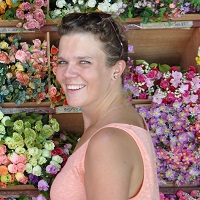 Frei has been living in Southeast Asia since 2007, and currently lives in Phuket, Thailand.
Frei has been living in Southeast Asia since 2007, and currently lives in Phuket, Thailand.
She is a hospitality professional with a strong background in PR and marketing communications, and loves to write about living abroad on her blog, Frei's Days.
She talks to us about adapting to the pace of island life, the dangers of Thai traffic and living life to the fullest.
About Frei
Q: Where are you originally from?
A: Nijmegen, the Netherlands
Q: Where are you living now?
A: Phuket, Thailand
Q: When did you move to Thailand?
A: September 2013
Q: Did you move here alone or with family?
A: I moved here with my husband.
Q: Why did you move; what do you do?
A: We moved here, as my husband had a new job offer in Phuket. Unfortunately, it’s hard to find a job here in my area of expertise, due to the long low season and also the rules and regulations for foreigners to get a visa. Therefore I am now volunteering (doing admin tasks and updating a website), started my own blog, write for other blogs, and I am in the process of starting my own company so that it will be easier to do project-based jobs in the region.
Living in Thailand
Q: What do you enjoy most about your home? How would you rate the quality of life compared to your home country?
A: Phuket is a beautiful island, especially in the dry season, with a laid back atmosphere. I love being able to look outside the window and see the beautiful sea right in front of our apartment. And after living in Ho Chi Minh City, Vietnam, for the past couple of years, I can really appreciate the clean air here.
As life is more affordable here, I think the quality of life is a lot better than in Holland. We’re able to travel more and, in a way, enjoy life more.
Q: Any negatives? What do you miss most about home?
A: Having lived in metropolitan cities for the last seven years (Singapore for almost three and Ho Chi Minh City for almost four years) I miss the hustle and bustle the city has to offer. Here it takes you a while before you find the right place to do your shopping, find a nice restaurant, and many more things that are easily available in the city. Besides that it’s difficult to find a job here for foreigners.
Q: What are the biggest adjustments you had to make when settling into expat life in Thailand? Did you experience any particular elements of culture shock?
A: My biggest adjustment has to be that I am no longer working here. Coming from a 50 to 60 hour work week and needing to sit back and make your own schedule at home is difficult. Luckily I have found something to do for most days in the week, but it was very hard getting to this point.
Q: What’s the cost of living compared to home? What is cheap or expensive in particular?
A: Live in Phuket is considerably cheap. You can rent a nice apartment for a fraction of the money for an apartment in Holland, also the food – which is delicious here – is very cheap. A Thai main course in a normal restaurant will cost you about USD 5. However, compared to all the other items, alcohol is pretty expensive, with a local beer starting at USD 3 and wine being around USD 5.
Q: How would you rate the public transport? What are the different options? Do you need to own a car?
A: There is no real public transport in Phuket. There is a bus that drives around the island in a loop. So if you want to visit a village next to yours, but it’s in the opposite direction of where the bus is going to, the trip can be an hour and a half drive.
Many expats drive around on a motorbike or rent a car, which are the easiest ways to get around town. An international driver’s licence can be used for the first year you’re living here, after which you need to exchange it for a Thai driver’s licence. Do remember that a motorbike here goes up to 150cc, for which you need to have a motorcycle drivers license in most countries.
Q: How would you rate the healthcare in Phuket? Have you had any particularly good/bad experiences with regards to doctors and hospitals? Are there any hospitals you would recommend?
A: Healthcare is pretty good in Phuket, with 3 big international hospitals, being Bangkok Hospital Phuket, Phuket International Hospital and the Mission Hospital Phuket. I am fortunate that I have yet to experience a visit to the hospital.
Q: What are the biggest safety issues facing expats living in Thailand? Are there any areas expats should avoid?
A: Besides the road safety issues (it can be pretty scary to drive around here, as many roads are in the hills with sharp curves, potholes and people driving too fast), there are no real safety issues in Phuket. Of course, there are the regular bag snatching incidents, but no other major issues.
Q: How do you rate the standard of housing in Phuket? What different options are available for expats?
A: The standard of housing can vary tremendously in Phuket. Here you can find a house for around 10,000THB per month, or you can rent a three-bedroom apartment in a condominium complex with all amenities starting from 30,000THB (depending on the area you’re looking at).
Q: Any areas you’d recommend for expats to live in?
A: There are many different areas to live in Phuket, and it all depends on what you’re looking for. Many singles and couples (usually without kids) live in Patong area, as it’s a vibrant town that has a lot to offer – from shopping to a beautiful beach.
Close by you will find Bang Tao area, with laguna and layan beaches. Here you find many families and couples looking for a more laid-back lifestyle. Many of the people living here come from elsewhere in Southeast Asia.
If you’re going further down to the south of the island you will find places such as Nai Harn. The area has been able to escape the mass development that you can find in other parts of the island, which makes this a less crowded area to live in. This is one of the reasons why Nai Harn is more popular with retirees and older couples.
As you can see, Phuket has an area to live for almost everyone. You just need to explore the island and see what feels best for you.
Meeting people and making friends
Q: How tolerant are the locals of foreigners? Is there any obvious discrimination against particular groups of people?
A: The Thai are very tolerant people and are super friendly; however, there is a language barrier that makes it very difficult to mix with the local people. As Thailand has never been under foreign reign, they have never had the need to speak a different language and they are very proud of their own language. They are very open with teaching you their language – however their English skills are not great. For this reason foreigners usually hang out with other foreigners.
Q: Was it easy meeting people and making friends? How did you go about meeting new people?
A: As I do not have a job, it was hard for me to start meeting new people. However, before we moved to Phuket I found a website called Chicky Net, which is a social network for expat women living in Thailand. By attending several of the events organized through this website, I got to know a lot of new women.
Q: Have you made friends with locals or do you mix mainly with other expats? What advice would you give to new expats looking to make friends? Any social/expat groups you can recommend?
A: I mainly mix with other expats, as my Thai is not great and most of the Thai don’t speak too much English. For women that move to Thailand (particularly Phuket, Bangkok, Chiang Mai and Hua Hin) join the Chicky Net, the social network for expat women. This site has many forums, a lot of information on where to go and what to do, and also posts regular information of events that are organised by Chicky Net members. It is a great place to start making new friends.
About working in Thailand
Q: Did you have a problem getting a visa or work permit? Did you tackle the visa process yourself or did you enlist the services of an immigration consultant?
A: As I joined my husband, his company arranged for a visa pretty easily for the both of us. I have a dependent visa, which means that I am not allowed to work, but I am allowed to stay in the country as long as my husband is working here.
Q: What is the economic climate like in Phuket? Do you have any tips for expats looking to find a job there? Which resources did you find most useful?
A: It’s pretty difficult to find a job in Phuket, as there are many restrictions around companies hiring an expat worker, and there is a long low season for which foreigners are usually too expensive to be around.
Most of the expats that get here without a job in advance, are most likely to find a job in teaching or hospitality. However, you do need to have a diploma for these jobs (preferably a Bachelor’s degree) or a lot of work experience, as without this it is very unlikely to get a visa.
Family and children
Q: Did your spouse or partner have problems adjusting to their new home? Do you think there are any specific challenges for a trailing spouse?
A: In this situation I am the trailing spouse. However, I think for my husband it was hard to adjust to our new lifestyle too. Having always worked in metropolitan cities, where the pace is very high, he expects the same from his team. With living and working on an island this is totally different, and that is one of the things he definitely had to get used to.
And finally…
Q: Is there any other advice you would like to offer new expat arrivals?
A: I have learned to live life to the fullest since moving abroad. There is so much to explore in a foreign country, and usually so little time. Make sure you get to know the local people and the culture when living in Phuket (or anywhere else for that matter), it will help you to settle in better and also makes it easier to understand the local people.
– Interviewed in August 2014



